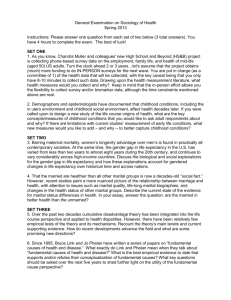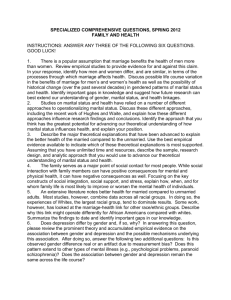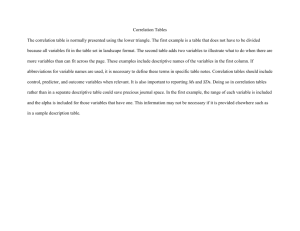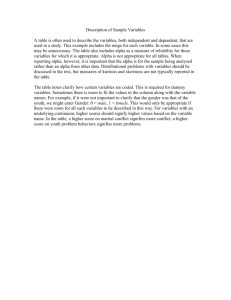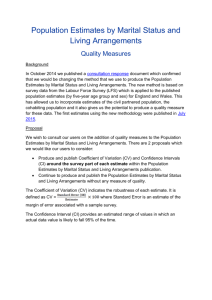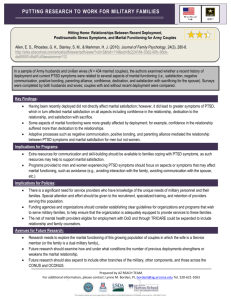Relation between Emotional Intelligence and Forgiveness with
advertisement
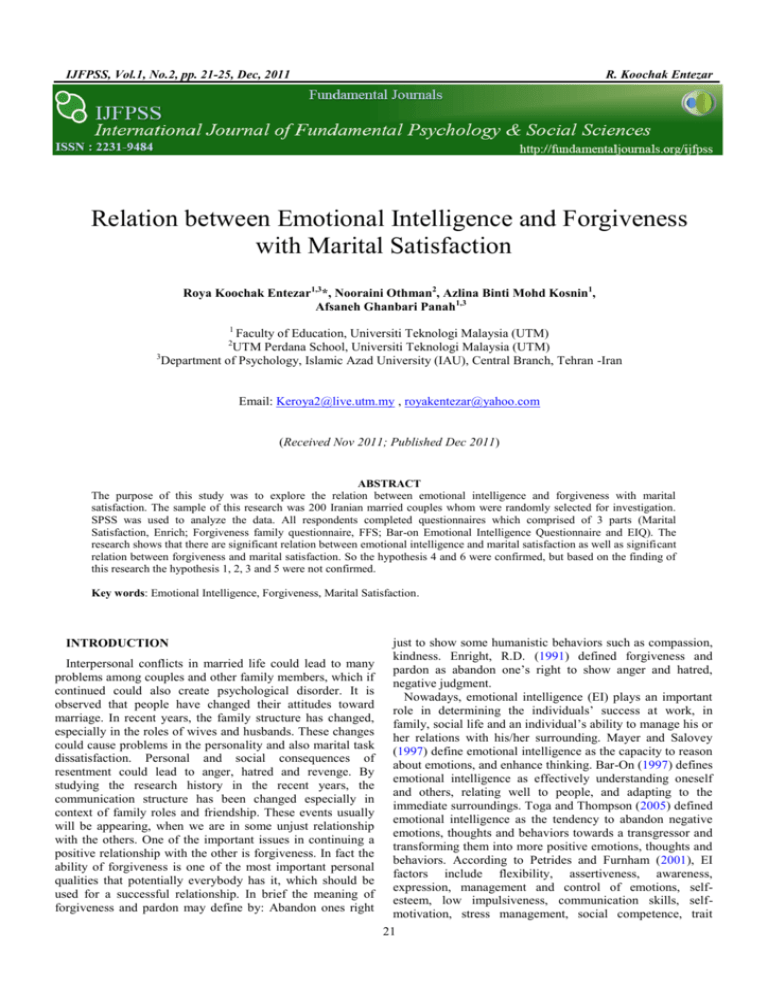
IJFPSS, Vol.1, No.2, pp. 21-25, Dec, 2011 R. Koochak Entezar Relation between Emotional Intelligence and Forgiveness with Marital Satisfaction Roya Koochak Entezar1,3*, Nooraini Othman2, Azlina Binti Mohd Kosnin1, Afsaneh Ghanbari Panah1,3 1 Faculty of Education, Universiti Teknologi Malaysia (UTM) UTM Perdana School, Universiti Teknologi Malaysia (UTM) 3 Department of Psychology, Islamic Azad University (IAU), Central Branch, Tehran -Iran 2 Email: Keroya2@live.utm.my , royakentezar@yahoo.com (Received Nov 2011; Published Dec 2011) ABSTRACT The purpose of this study was to explore the relation between emotional intelligence and forgiveness with marital satisfaction. The sample of this research was 200 Iranian married couples whom were randomly selected for investigation. SPSS was used to analyze the data. All respondents completed questionnaires which comprised of 3 parts (Marital Satisfaction, Enrich; Forgiveness family questionnaire, FFS; Bar-on Emotional Intelligence Questionnaire and EIQ). The research shows that there are significant relation between emotional intelligence and marital satisfaction as well as significant relation between forgiveness and marital satisfaction. So the hypothesis 4 and 6 were confirmed, but based on the finding of this research the hypothesis 1, 2, 3 and 5 were not confirmed. Key words: Emotional Intelligence, Forgiveness, Marital Satisfaction. INTRODUCTION Interpersonal conflicts in married life could lead to many problems among couples and other family members, which if continued could also create psychological disorder. It is observed that people have changed their attitudes toward marriage. In recent years, the family structure has changed, especially in the roles of wives and husbands. These changes could cause problems in the personality and also marital task dissatisfaction. Personal and social consequences of resentment could lead to anger, hatred and revenge. By studying the research history in the recent years, the communication structure has been changed especially in context of family roles and friendship. These events usually will be appearing, when we are in some unjust relationship with the others. One of the important issues in continuing a positive relationship with the other is forgiveness. In fact the ability of forgiveness is one of the most important personal qualities that potentially everybody has it, which should be used for a successful relationship. In brief the meaning of forgiveness and pardon may define by: Abandon ones right just to show some humanistic behaviors such as compassion, kindness. Enright, R.D. (1991) defined forgiveness and pardon as abandon one’s right to show anger and hatred, negative judgment. Nowadays, emotional intelligence (EI) plays an important role in determining the individuals’ success at work, in family, social life and an individual’s ability to manage his or her relations with his/her surrounding. Mayer and Salovey (1997) define emotional intelligence as the capacity to reason about emotions, and enhance thinking. Bar-On (1997) defines emotional intelligence as effectively understanding oneself and others, relating well to people, and adapting to the immediate surroundings. Toga and Thompson (2005) defined emotional intelligence as the tendency to abandon negative emotions, thoughts and behaviors towards a transgressor and transforming them into more positive emotions, thoughts and behaviors. According to Petrides and Furnham (2001), EI factors include flexibility, assertiveness, awareness, expression, management and control of emotions, selfesteem, low impulsiveness, communication skills, selfmotivation, stress management, social competence, trait 21 IJFPSS, Vol.1, No.2, pp. 21-25, Dec, 2011 empathy, trait happiness and trait optimism. In one study, married participants were asked to rate both their own and their partners’ EI (Schutte et al., 2001). Participants with higher self-reported EI reported significantly higher relation satisfaction than those with lower self-reported EI. Furthermore, those participants who rated their partners higher in EI also received higher scores for relation satisfaction. Fitness (2001) pointed out that emotion perception, understanding and reasoning about emotions and regulating or managing emotions are important in marriage. However, Fitness further suggests that the link between marital happiness and these aspects of emotional intelligence may not always be related. In another study, married couples with higher self-reported emotional intelligence reported higher marital satisfaction (Schutte, Malouff, Bobik, Coston, Greeson, Jedlicka, Rhodes, & Wendorf, 2001). It is observed that these studies focus on overall emotional intelligence abilities or perception of it, not on individual aspects. The relationship between EI and gender has similarly received some attention in recent years. For example Mandell and Pherwani (2003) found a significant difference in the EI scores of male and female managers, where females on average scored higher than males. In another study Rieff (2001) showed that EI has higher level in female than male. These findings suggest that females seemed to be able to control their emotions better and manage others’ emotions better compared to males. This is in contrast to Goleman (1998) who insinuated that there are no differences in the overall EI scores of males and females. The growing number of recent studies on forgiveness is an indication that forgiveness is being increasingly recognized as a psychological issue and a therapeutic option for relationship problems and marital conflicts. Researchers have found that forgiveness can lead to greater emotional and relationship health (Orathinkal and Vansteenwegen, 2006). Based on some studies in the recent years, the communication structures have been changed especially in the context of family roles, friendship and break ups friend. One of the important points to continue a positive relationship with the other person is to forgive him for wrong done. According to Kalayjian and Paloutzian (2009) forgiveness can help relationship problems and marital conflicts. Researchers who investigate in the field of family communications found that forgiveness could lead to greater positive emotional and healthy relationships. In addition, it has positive correlation with mental and physical health (Orathinkal and Vansteenwegen, 2006; Gangdev, 2009). In fact, forgiveness is one of the most important personal qualities that everybody potentially has, which, it should be used to build a successful relationship. Since few studies have been done on the impact of forgiveness and EI in predicting Iranian marital satisfaction and their relationship, the purpose of this research is to determine the contribution of EI and forgiveness in predicting satisfaction in marital communication among Iranian married couples. PROBLEM STATEMENT Psychologists believe, forgiveness and pardon are important in healing of offence and improvement of mental R. Koochak Entezar health in interpersonal relations (Ghobari, 2005) and also various forgiveness theory have shown the key role of emotions in forgiving others (Malcolm,. et al., 2005). The emotional intelligence factors are among the factors which contribute to people succeeding in their life and they are directly effective on mental health (Bar-on, 1997). In the tumultuous world of industrial world, where people are constantly exposed to stress, mental health specialists encourage people to find ways for increasing their ability to confront with stressor factors. One of the mechanisms which are being used in recent decades is forgiveness and pardon mechanism. Also, considering the fact that the amount of understanding and control of emotions are effective in advancement of interpersonal relationship and satisfaction of them, it can be used and recommended as a medical treatment method for individuals and families. Thus it proves the importance and necessity of such research. In this research the purpose of study are examine the differences in emotional intelligence, marital satisfaction and forgiveness between male and female. Furthermore, identify the relation between emotional intelligence and marital satisfaction as well forgiveness. Finally, identify the relation between forgiveness and marital satisfaction. So the questions of this study are: 1-Is there any differences in EI among male and female? 2-Is there any differences in marital satisfaction among the male and female? 3-Is there any differences in forgiveness among male and female? 4-Does the level of emotional intelligence have any relation with marital satisfaction? 5-Does the level of emotional intelligence have any relation with forgiveness? 6-Does the level of forgiveness have any relation with marital satisfaction? RESEARCH METHODOLOGY: SAMPLE The sample of this study was 200 married students (100 female and 100 male) from all married students who study in Iranian Islamic Azad University, Tehran Central Branch (2009-2010) which selected randomly. The data were collected via questionnaires. RESEARCH INSTRUMENTS In this study, Enrich Marital Satisfaction scale is used which consists of 12 sub scales and48 questions. Forgiveness family questionnaire (FFS) which has 38 questions was used for measuring family forgiveness. And Bar-on Emotional Intelligence Questionnaire was used which is a questionnaire with 90 questions and five general scales, and 15 sub scales. DATA ANALYSIS The method of Data analysis was based on a multivariate correlation analysis, Multivariable analysis of variance (MANOVA), analysis of variance one variable (ANOVA) and also T- test. SPSS software was used for statistical analysis. 22 IJFPSS, Vol.1, No.2, pp. 21-25, Dec, 2011 R. Koochak Entezar Hypothesis 1: “There is no significant difference in the level of emotional intelligence between male and female”. Table2-1: Results of MANOVA tests for significant main effect of sex on the sub-scale of Marital Satisfaction. To explore this hypothesis, independent T- test was used to compare mean scores of emotional intelligence in male and female. The results are presented in table 1. Test Pillaie- Bartlett Trace Wilks’Lambada Hoteling-Lawley Trace Roy’s largest Root Table1: t-test results for comparison EI in term of gender by T-test Statistical measurement Emotional Intelligence Gender Average SD Female 214.48 37.31 Male 206.27 35.53 t df α 1.59 198 0.113 As the results of Table 1 shows the calculated T-test for the emotional intelligence (1.59) in Level 0.05 is not significant, it could be concluded that emotional intelligence is not different between male and female .So the research hypothesis based on differences between male and female in emotional intelligence is not confirmed. In order to investigate the significant differences between the averages of sub-scale of Emotional Intelligence in male and female, Multivariable analysis of variance (MANOVA) was used; which showed that the effect of gender variable on related variables (emotional intelligence) was not significant. Results of significant MANOVA test are presented in Table 1-1. Table1-1: Results of MANOVA T-test and significant effect of gender on the scale of emotional intelligence. Test Pillaie- Bartlett Trace Wilks’Lambada Hoteling-Lawley Trace Roy’s largest Root Value 0.049 0.951 0.052 0.052 α 0.08 0.08 0.08 0.08 F 2.03 2.03 2.03 2.03 As seen in Table 1-1, MANOVA, tests of significance in relation to gender factor in level 0/05 are not significant. Therefore, the effect of gender factor on the dependent variables (Emotional Intelligence) is not significant. Hypothesis 2: There is no significant difference in Marital Satisfaction between male and female. To evaluate this hypothesis, independent T- test was used to compare mean scores for marital satisfaction in male and female. The results are presented in Table 2. Table2: Results of t- test for comparison of Marital Satisfaction and sex. Statistical measurement Marital Satisfaction Gender Average SD Female 109.44 30.19 Male 101.98 30.17 T 1.75 df 198 α 0.082 As Table 2 shows the results of the T test calculated for the marital satisfaction (1.75) in Level 0.05 is not significant, so it could be concluded that marital satisfaction in men and women is not different. To study significant differences between mean sub-scale of marital satisfaction of male and female, multivariable analysis of variance (MANOVA) was used. It showed that three sub-scale of marital satisfaction, including satisfaction, marital relationship and financial conflict at P< 0.05, are significant in male and female. Significant MANOVA test results are presented in table 2-1. Value 0.167 0.833 0.200 0.200 α 0.001 0.001 0.001 0.001 F 3.26 3.26 3.26 3.26 As seen in Table 2-1, MANOVA tests of significance in relation to sex factor in level of 0.001 are significant. Therefore, the effect of gender factor on the dependent variables of marital satisfaction is significant. Considering significance of MANOVA tests, result of analysis of variance one variable ANOVA separately was used for analysis of each dependent variable which is presented in table 2-2. Table 2-2: Summary separate results of ANOVA for each sub-scales of marital satisfaction. Dependent Variables Satisfaction Personal issues Marital relationship Conflict solution Financial conflicts Leisure times Sex Children Friends and relatives Ideological orientation Total totality 483.33 28.97 100.14 1.47 43.50 0.575 0 10.63 6.64 0.368 df 1 1 1 1 1 1 1 1 1 1 Mean square 483.33 28.97 100.14 1.47 43.50 0.575 0 10.63 6.64 0.368 F α 7.87 2.98 4.91 0.96 6.79 0.059 0 0.821 0.589 0.029 0.006 0.086 0.028 0.757 0.01 0.808 1 0.366 0.444 0.871 As seen in Table 2-2, the sex factor F calculated for the three subscales of marital satisfaction, including satisfaction, marital relationship and the level of financial conflicts is in level (0/05), so in satisfaction scale, marital relationship and conflicts financial are significant differences between men and women. Hypothesis 3: There is no significant difference in Forgiveness between male and female. To evaluate this hypothesis, the independent t-test was used separately for comparison of forgiveness in the original family and nuclear family. The results are presented in table 3. Table3: T-test results for comparing forgiveness based on sex. Statistical measurement Original family Nuclear family Gender Average Female 46.45 Standard deviation 2.51 Male Female 47.05 51.65 6.04 5.62 Male 51.95 5.85 α t df 0.676 198 0.50 0.370 198 0.712 As table 3 shows the results of T-test for the forgiveness in the original family (-0.676) and the nuclear family (-0.370) at level 0.05 is not significant. It could be concluded that forgiveness in men and women is not different and therefore the research hypothesis that there is difference in forgiveness in men and women is not confirmed. There is no significant difference in forgiveness mean in two groups of male and female. Hypothesis 4: There are significant relation between emotional intelligence and marital satisfaction. 23 IJFPSS, Vol.1, No.2, pp. 21-25, Dec, 2011 R. Koochak Entezar To evaluate this hypothesis, Pearson correlation between emotional intelligence and marital satisfaction were calculated then significant t-test for measurement of correlation coefficient was used. The result is presented in table 4. Table4: Results of the correlation coefficient for the relation between Emotional Intelligence and Marital Satisfaction Statistical measure EI-MS Number 200 Correlation coefficient 0.405 α 0.001 Coefficient of determination 16.40 Results in table 4 shows that the correlation coefficient calculated between emotional intelligence with marital satisfaction (0.405) in level of less than 0.01 is meaningful, and it could be concluded that there is a significant relationship between marital satisfaction and emotional intelligence. If the relationship between emotional intelligence and marital satisfaction is positive, thus increasing the emotional intelligence, increases marital satisfaction, and vice versa. Calculated coefficient of determination indicates that 16.40 percent of the variance of marital satisfaction could be generally explained by emotional intelligence. Hypothesis 5: There are significant relation between emotional intelligence and forgiveness. To evaluate this hypothesis, Pearson correlation between emotional intelligence and forgiveness was calculated then the test of significant correlation was used. The results are presented in table 5. Table 5: Results of the correlation coefficient for the relationship between Emotional Intelligence and Forgiveness. Statistical measure EI-original family EI-nuclear family Number 200 200 Correlation coefficient 0.128 0.128 α 0.071 0.071 Results of table 5 shows that the correlation coefficient calculated between emotional intelligence and forgiveness in the original family as well as the nuclear family with level of the 0.05 is not significant, so it could be concluded that there is no significant relation between emotional intelligence and forgiveness. Hypothesis 6: There are significant relation between forgiveness and marital satisfaction. To evaluate this hypothesis, Pearson correlation between forgiveness and marital satisfaction were calculated and then the significant test for measuring of correlation coefficient was used. The results are presented in Table 6. Table 6: Results of the correlation coefficient for the relationship between marital satisfactions and forgiveness Statistical measure MS-Original family MS-Nuclear family No Correlation coefficient α Coefficient of determination 200 0.171 0.015 2.92 200 0.243 0.001 5.90 Results of table 6 shows that the correlation coefficient calculated between marital satisfaction and forgiveness in the original family (0.171) as well as nuclear families (0.243) at levels less than 0.05 is meaningful, so it could be concluded that measurement between forgiveness and marital satisfaction are significantly related. As the relation between forgiveness and marital satisfaction is positive, thus by increasing forgiveness, marital satisfaction increases, and vice versa. Calculated coefficient of determination indicates that forgiveness in the original family is 2.92 percent and in the nuclear family is 5.90 percent of the variance of marital satisfaction. CONCLUSION: According to analysis of obtained data, the first hypothesis” There are significant differences in emotional intelligence in male and female” was not confirmed. In confirmation of this conclusion these researchers could be mentioned: Grossman & Wood (1993); Feldman et al. (1998); Goleman (1998) who insinuated that there are no differences in the overall EI scores of males and females. It could be related on socialization and emotional teachings of girls and boys in childhood .According to analysis of obtained data, the second hypothesis” There are significant differences in marital satisfaction in male and female” was not confirmed. Some researchers indicated that many factors could be effective between marital satisfaction and gender. For example religion, financial well being factors, culture, sexual relationship, communication between parents and children (Fowers, 1991; Whisman et al, 2004), however, the finding of this research is against previous researches. According to analysis of obtained data, the third hypothesis” There are significant differences in forgiveness in male and female” was not confirmed. Gender differences in forgiveness could be due to cultural differences in forgiveness, race, and ethnicity on cultural value orientations. (Miller, Worthington & McDaniel, 2008). So the finding of this research is against previous researches. According to analysis of obtained data, the forth hypothesis” There are significant relation between emotional intelligence and marital satisfaction” was confirmed. The correlation coefficient calculated between emotional intelligence and marital satisfaction (0.405) in level of less than 0.01 is meaningful, so it could be concluded that there is a significant relation between marital satisfaction and emotional intelligence. If the relation between emotional intelligence with marital satisfaction is positive, thus increasing the emotional intelligence, increases Marital Satisfaction, and vice versa. Calculated coefficient of determination indicates that 16.40 percent of the variance of marital satisfaction could be generally explained by emotional intelligence. In confirmation of this conclusion it could be indicated that results of researches of Fitness (2001) and Bricker (2005). Their research results showed that there are positive relationships between emotional intelligence and marital communications. Consequently, if couples increase their emotional intelligence ability such as management, control of emotions, self –esteem and awareness, then they could be able to get more satisfaction in marital communication. According to analysis of obtained data, the fifth hypothesis” There are significant relation between 24 IJFPSS, Vol.1, No.2, pp. 21-25, Dec, 2011 emotional intelligence and forgiveness” was not confirmed. Some researchers have found that forgiving can lead to greater emotional and relational health and has been related to emotional control and empathic ability (Enright & Fitzgibbons, 2000; Baucom, 1998), so the finding of this research is against previous researches. Here, the difference may be because of different cultures or limitations of this study. According to analysis of obtained data, the sixth hypothesis” There are significant relation between forgiveness and marital satisfaction” was confirmed. The correlation coefficient calculated between marital satisfaction and forgiveness in the original family (0.171) and also in nuclear families (0.243) at level less than 0.05 is meaningful, REFRENCES Bar-On R (1997). Development of the BarOn EQ-i: a measure of emotional and social intelligence. Paper presented at the 105th Annual Convention of the American Psychological Association Chicago. Bricker D (2005). The link between emotional intelligence and marital satisfaction. MA dissertation. University ofJohannesburg. Enright RD, Fitzgibbons RP (2000). Helping clients forgive: An empirical guide for resolving anger and restoring hope. Washington, DC: American Psychological Association. Enright, R.D., & The Human Development Study Group (1991). The moral development of forgiveness. In W. Kurtines & J. Gerwirtz (Eds.), Handbook of moral behavior and development (Vol. 1; pp. 123152). Hillsdale, NJ: Lawrence Erlbaum Feldman Barrett, L., & Aronson, K. (1998). Emotion differentiation and stressful life events. Unpublished raw data Fincham, F., & Beach, S. R. H. (2007). Forgiveness and marital quality: Precursor or consequence in wellestablished relationships? The Journal of Positive Psychology, 2(4), 260-268. Fitness J (2001). Emotional intelligence an intimate relationships. psychology press. Fowers, B. J. (1991). His and her marriage: A multivariate study of gender and marital satisfaction. Sex Roles, 24(3), 209-221. Ghobari B (2007).The relation between forgiveness and mental health among Tehran university students. J. Psychol. (Tehran University), 83: 167-180. Goleman, D. (1998). Working with emotional intelligence. New York: Banta Gordon KC, Baucom DH (1998). Understanding betrayals in marriage: A synthesized model of forgiveness. Family Process, 37: 425-449. Grossman, M., & Wood, W. (1993). Sex differences in intensity of emotional experience: A social role interpretation. Journal of Personality and social Psychology, 65(5), 1010. R. Koochak Entezar so it could be concluded that measurement between forgiveness and marital satisfaction have significant relation. As the relation between Forgiveness and Marital Satisfaction is positive, thus by increasing Forgiveness, Marital Satisfaction increases, and vice versa. Calculated coefficient of determination indicates that Forgiveness in the original family 2.92 percent and Forgiveness in the nuclear family 5.90 percent of the variance of marital satisfaction is generally explained. In confirmation of this conclusion these researchers could be mentioned: Orathinkal and Vansteenwegan (2006); Fincham at el (2007); Gordon and Baucom (1998) Kalayjian A, Palautzian RF (2009).Forgiveness and reconciliation: Psychological Pathways to conflict .Springer. Malcolm W, Warwar S, Greenberg L (2005). Facilitating forgiveness in individual therapy as an approach to resolving interpersonal injuries. In Everett L. Worthington, Jr. (Ed.), Handbook of forgiveness. New York: Rutledge. Mandell, B. & Pherwani, S. (2003). Relationship between emotional intelligence and TL style: A gender comparison. Journal of Business & Psychology, 17(3), 387-404. Mayer, J. D., & Salovey, P. (1997). What is emotional intelligence? In J. D. Mayer & P. Salovey (Eds.), Emotional development and emotional intelligence: Educational implications (pp. 3–34). New York: Basic Books Miller, A. J., Worthington Jr, E. L., & McDaniel, M. A. (2008). Gender and forgiveness: A meta-analytic review and research agenda. Journal of Social and Clinical Psychology, 27(8), 843-876. Orathinkal J, Vansteenwegen A (2006). The effect of forgiveness on marital satisfaction in relation to marital stability Contemporary Family Therapy, 28(2): 251-260. Petrides KV, Furnham A (2001). Trait emotional intelligence: Psychometric investigation with reference to established trait taxonomies. Eur. J. Pers., 15: 425–448. Schutte NS, Malouff JM, Wendorf G,Bobik C, Coston TD, Greeson C, Jedlicka C, Rhodes E (2001).Emotional intelligence and interpersonal relations. J. Soc. Psychol., 141: 523-536. Toga, A. W., & Thompson, P. M. (2005). Genetics of brain structure and intelligence. Annual Review of Neuroscience, 28, 1–23 Whisman, M. A., Uebelacker, L. A., & Weinstock, L. M. (2004). Psychopathology and marital satisfaction: the importance of evaluating both partners. Journal of Consulting and Clinical Psychology, 72(5), 830. 25
